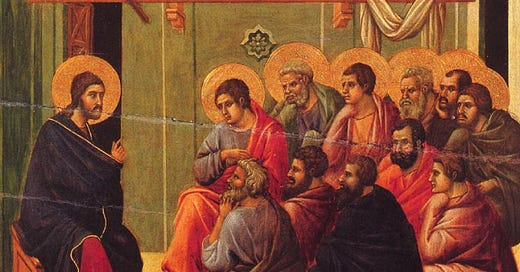Today I learned in none of the Gospels record Jesus saying “It is more blessed to give than to receive.” Paul cites Jesus as the source for the aphorism in today’s reading from Acts. Which, you know, is written by Luke, who also wrote the Gospel of Luke.
So why didn’t Luke include it in his Gospel? As far as we can tell, it’s because Luke didn’t know when Jesus said it.
Which is a good argument for the veracity of the Gospels, when you think about it. If the evangelists had felt free to just make up whatever, Luke would’ve included this line in his Gospel. But he didn’t, because he didn’t feel like he had the proper research.
On the other hand, there were several famous saying attributed to Jesus that were known at the time, so Luke was confident enough to quote Paul quoting Jesus.
Reading 1
Acts 20:28-38
At Miletus, Paul spoke to the presbyters of the Church of Ephesus: “Keep watch over yourselves and over the whole flock of which the Holy Spirit has appointed you overseers, in which you tend the Church of God that he acquired with his own Blood. I know that after my departure savage wolves will come among you, and they will not spare the flock. And from your own group, men will come forward perverting the truth to draw the disciples away after them. So be vigilant and remember that for three years, night and day, I unceasingly admonished each of you with tears. And now I commend you to God and to that gracious word of his that can build you up and give you the inheritance among all who are consecrated. I have never wanted anyone’s silver or gold or clothing. You know well that these very hands have served my needs and my companions. In every way I have shown you that by hard work of that sort we must help the weak, and keep in mind the words of the Lord Jesus who himself said, ‘It is more blessed to give than to receive.’”
When he had finished speaking he knelt down and prayed with them all. They were all weeping loudly as they threw their arms around Paul and kissed him, for they were deeply distressed that he had said that they would never see his face again. Then they escorted him to the ship.
Continuing from yesterday, Paul prays that the congregation will be kept safe. Interestingly, he’s concerned about both dangers from the outside and false prophets from within. The people of the church aren’t perfect; we have to look to God, rather than each other, for answers.
Responsorial Psalm
PS 68:29-30, 33-35a, 35bc-36ab
R. Sing to God, O kingdoms of the earth.
Show forth, O God, your power,
the power, O God, with which you took our part;
For your temple in Jerusalem
let the kings bring you gifts.
R. Sing to God, O Kingdoms of the earth.
You kingdoms of the earth, sing to God,
chant praise to the Lord
who rides on the heights of the ancient heavens.
Behold, his voice resounds, the voice of power:
“Confess the power of God!”
R. Sing to God, O kingdoms of the earth.
Over Israel is his majesty;
his power is in the skies.
Awesome in his sanctuary is God, the God of Israel;
he gives power and strength to his people.
R. Sing to God, O kingdoms of the earth.
This is a psalm for a ceremony that’s been last to time. It might be the Feast of Tabernacles? No one’s really sure. But it’s clearly a song of praise, so we use it for that purpose.
God first revealed himself to Israel, but all the kings come to Jerusalem to bring gifts and praise. God is above everything, and is full of power.
But as glorious as He is, He deigns to reach down to us, and support us with His might. Whatever challenges we’re facing, we can ask God for just a tiny part of His strength to keep going.
Alleluia
See Jn 17:17b, 17a
R. Alleluia, alleluia.
Your word, O Lord, is truth;
consecrate us in the truth.
R. Alleluia, alleluia.
This is why we read the Bible at mass.
Gospel
Jn 17:11b-19
Lifting up his eyes to heaven, Jesus prayed, saying: “Holy Father, keep them in your name that you have given me, so that they may be one just as we are one. When I was with them I protected them in your name that you gave me, and I guarded them, and none of them was lost except the son of destruction, in order that the Scripture might be fulfilled. But now I am coming to you. I speak this in the world so that they may share my joy completely. I gave them your word, and the world hated them, because they do not belong to the world any more than I belong to the world. I do not ask that you take them out of the world but that you keep them from the Evil One. They do not belong to the world any more than I belong to the world. Consecrate them in the truth. Your word is truth. As you sent me into the world, so I sent them into the world. And I consecrate myself for them, so that they also may be consecrated in truth.”
Jesus is praying a prayer of intercession, asking God to watch over the Apostles, and by extension, the future Church. In some ways, it’s similar to the Lord’s Prayer, which comes from Matthew and Luke, but John doesn’t have a formal version of.
But instead of “deliver us from evil,” He says, “Keep them from the Evil One.” A person.1 Evil isn’t an abstract concept; it’s something we chose to do.
The Evil One may be Satan, or a nation’s leader, or your neighbor, or you.2 We don’t know who are the wolves among us that Paul warned about. All we can say for sure is we don’t want to be someone else’s evil one.
We should take both Paul and Jesus’ prayers and turn them inward, as well as looking outward, at ourselves and not just those around us.
Not necessarily a human.
Or me.





